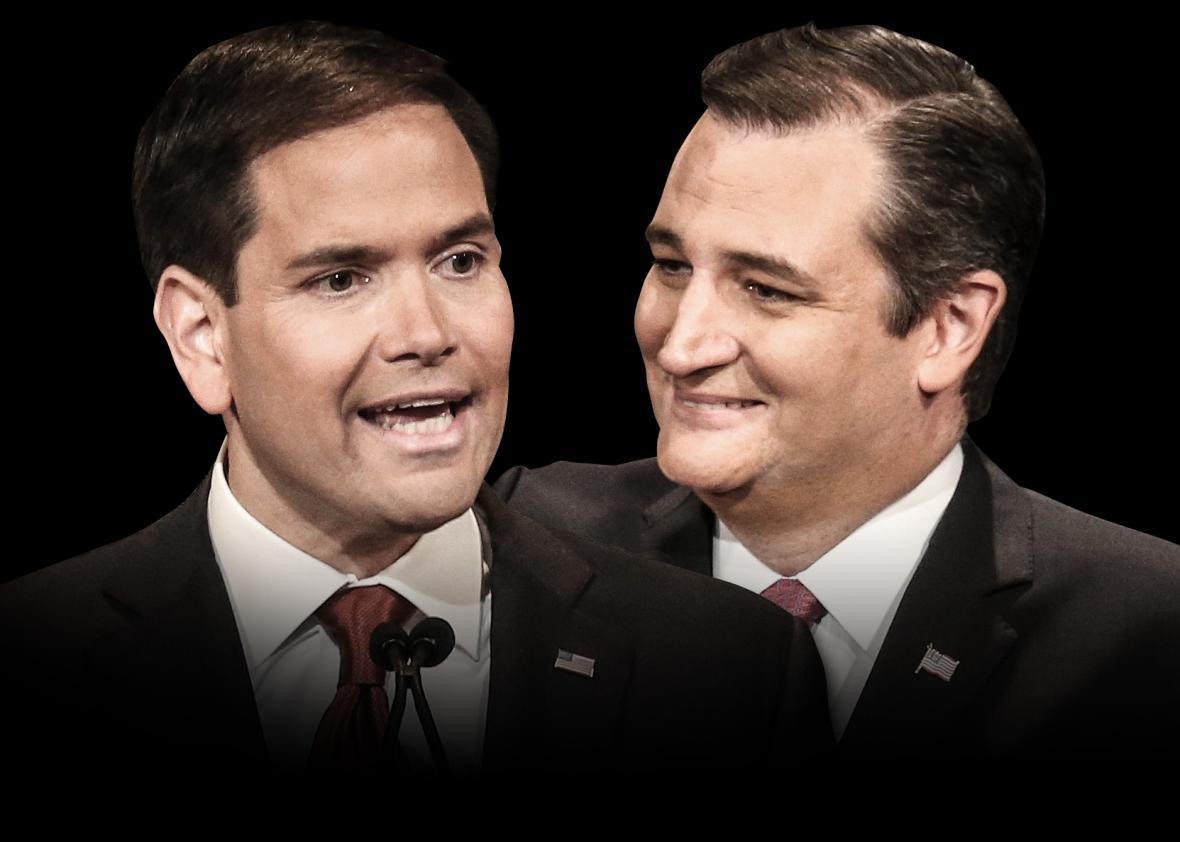Unlike the past two Republican prime-time debates, there was no clear winner on the Fox Business stage Tuesday night. Sens. Marco Rubio and Ted Cruz, though, appeared to do the most to help themselves at a time when a chaotic nomination race is starting to slowly come into focus.
The two were poised and confident throughout the night, inserting themselves into the conversation when it served them and playing it safe when it didn’t. Rubio arrived in Milwaukee as many pundits and politicos’ favorite for the GOP nomination, and he’ll leave that way too. Cruz, meanwhile, stood out at a time when his slow-but-steady strategy is beginning to take hold.
In one of the most memorable exchanges of the evening, Rubio tangled with Rand Paul over defense spending by tossing red meat to his party’s hawks: “We can’t even have an economy if we’re not safe.” Cruz, then, muscled in to make his own play for the swath of the electorate between Rubio and Rand on foreign policy. “There is a middle ground that brings both of these together,” Cruz said. “You think defending this nation is expensive; try not defending it. That’s a lot more expensive. But can you do that and pay for it?”
Rubio’s best moment may have been one that didn’t happen. During a lengthy and spirited exchange about immigration—a topic Rubio would prefer to avoid given his role in the Senate bill conservatives decry as “amnesty”—the moderators attempted several times to cut to the Florida senator. But thanks to several interruptions from Ohio Gov. John Kasich and former Celebrity Apprentice host Donald Trump, by the time it was Rubio’s turn to talk he was met with a different question about innovation and jobs. “That,” a relieved-looking Rubio responded, “is an excellent question.”
While Rubio was able to avoid his biggest weakness, Cruz was running toward his strength to fire up his base. When the moderators pressed the Texas firebrand on his proposal to raise the retirement age and cut benefits for future retirees, Cruz quickly dismissed the question to return to Jeb Bush’s earlier claim that the GOP hard-line positions on immigration would hurt them in the general election. “What was said was right,” Cruz bellowed, “the Democrats are laughing—because if Republicans join Democrats as the party of amnesty, we will lose.” The crowd in Wisconsin ate it up.
The two men lived up to their reputations as the smoothest orators in the GOP field, but neither was perfect on Tuesday. While rattling off the five federal agencies he’d like to cut, Cruz needed to list the same one twice to make his self-imposed quota. “The IRS, the Department of Commerce, the Department of Energy, the Department of Commerce, and HUD,” he said. (He blanked on the Department of Education.) Fortunately for him, though, the moderators moved on before he could go full Rick Perry. Rubio’s biggest misstep, meanwhile, came after a lengthy windup about the importance of being a good parent that ended with a distinctly different P-word. “The most important job any of us will [have],” he said, “is the job of being a president.”
Those small stumbles aside, though, both men dominated the stage in ways that they hadn’t before. Rubio is unlikely to benefit as much from his performance in Milwaukee as he did from Jeb’s performance in Boulder, Colorado, when the former establishment favorite tanked in the last debate, but he survived his first debate as everyone else’s favorite target. Cruz, meanwhile, expanded his debate repertoire beyond just bashing the liberal media—though he did manage to do that too. And both men were able to take big swipes at Hillary Clinton near the end of the debate, billing her as a successor to what they described as the failed policies of Barack Obama. Tuesday’s debate, then, likely didn’t change the dynamics of the GOP race. But for Rubio and Cruz, that’s the best prize they could have asked for.
